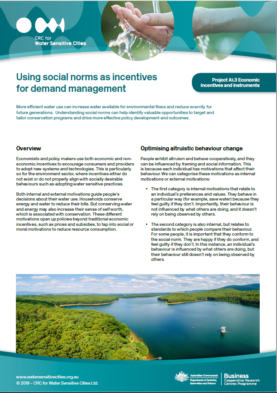Using social norms as incentives for demand management
Overview
Economists and policy makers use both economic and non-economic incentives to encourage consumers and providers to adopt new systems and technologies. This is particularly so for the environment sector, where incentives either do not exist or do not properly align with socially desirable behaviours such as adopting water sensitive practices. Both internal and external motivations guide people’s decisions about their water use. Households conserve energy and water to reduce their bills. But conserving water and energy may also increase their sense of self worth, which is associated with conservation. These different motivations open up policies beyond traditional economic incentives, such as prices and subsidies, to tap into social or moral motivations to reduce resource consumption.
